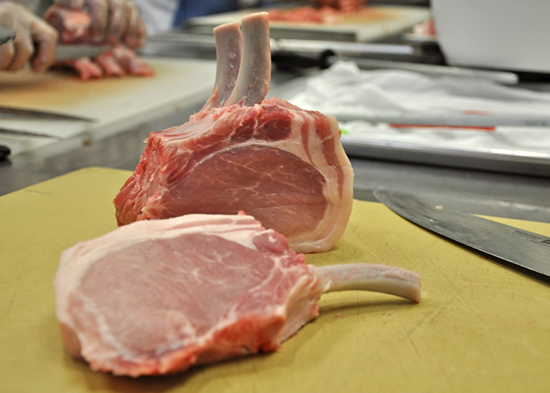ICE offers one of the country’s largest recreational cooking programs. With over 1,500 cooking classes and over 26,000 students each year, there is something for every cook looking to learn new techniques in the kitchen.

This month, Amy Roth of the blog Minimally Invasive, took Sustainable Meats with Dan Honig from Heritage Foods and ICE Chef Instructor Erica Wides — a rare chance to learn about the unique challenges and benefits of cooking pastured, grass-fed heritage meats. It’s easy to be overwhelmed when you're first browsing the recreational course catalog at ICE. I certainly was.
But then I started thinking about what might provide the most value in my day-to-day life, what I could learn that would make a real difference in how I cook. Though I don’t write about it much, two topics I care passionately about are animal welfare and the food system, so ICE’s Sustainable Meats course jumped out at me right away.
While it may sound paradoxical to eat meat yet love animals, these two positions can co-exist without too much cognitive dissonance. I’m quite content to be an omnivore, provided I’m buying grass-fed or pastured meats from animals that live healthy lives and meet their ends humanely. Enter Chef Instructor Erica Wides, who is committed to educating the public about real food and nutrition, and who taught our course last Friday.
After a brief overview, she turned the floor over to Dan Honig from Heritage Foods USA, who supplied the truly astounding bounty of meats we cooked within the class. Dan briefly walked us through Heritage Food’s strategy to bring heritage breeds back into the market by partnering with smaller farms in the Midwest. Their production is just a drop in the bucket compared to the largest factory farms, but they’re dedicated to paying farmers a living wage while sustaining these breeds for us to enjoy.
Once the introductions were done, we got to work! Each of us got a copy of the recipes we’d make that evening and were told the order in which they needed to be cooked. Then Chef Erica divided us into two teams with instructions for us to divvy up the work as we saw fit. With a student-to-instructor ratio of 2:1, the atmosphere was relaxed and any questions we had were answered immediately. But perhaps the best part? NOT DOING DISHES. We were under the gun initially because our lamb tacos had to braise for a few hours, so we got that going right away.
Once the lamb was in the oven, we turned our attention to the appetizer — pork satay made with tenderloin. Everything was made fresh in this class, including the peanut butter, which was an absolute thrill for one of my teammates. I had the fun task of grilling the skewered and marinated tenderloin and learned something new in the process. You can cover the front of the grill with foil to keep the wooden skewers from burning. Simple, but so effective! But how did the satay taste? Well, I rarely eat pork tenderloin because it's just not very flavorful, but this Berkshire pork was juicy (despite my overcooking a few of the skewers) and off-the-charts delicious.
Our hunger sated, we moved on to preparing the rest of our meal. Thick heritage pork porterhouse chops were transformed into a heavenly dish with prunes, cream and Armagnac. We learned how to remove the backbone and keel bone from a chicken before cooking it under a brick (or under a small cast iron pan, which is much easier to come by).
Our final dish was Piedmontese hamburgers, complete with instructions for gauging doneness by touch rather than temperature. (The meat should spring back slightly for medium. That's how you know.) And through it all, we chatted with the instructors, got tips here and there and just generally had a ball. By the time dinner was ready, we were all astounded by the sheer amount of food, but pleased to have produced so much in so little time. And what can I say? Everything was wonderful.
The pork tasted the way I remember pork tasting when I was a kid. It had real depth and flavor because it wasn't devoid of fat. The burgers might've ruined me and I doubt I’ll be grabbing one at a restaurant for the foreseeable future. As for the chicken, I have a feeling it'll be featured in our house more often than I'm comfortable telling you right now. Even if you're not as on the bandwagon about grass-fed and pastured meats as I am, I'd highly recommend taking this class just to experience the quality and learn how easy good food can be to prepare.



